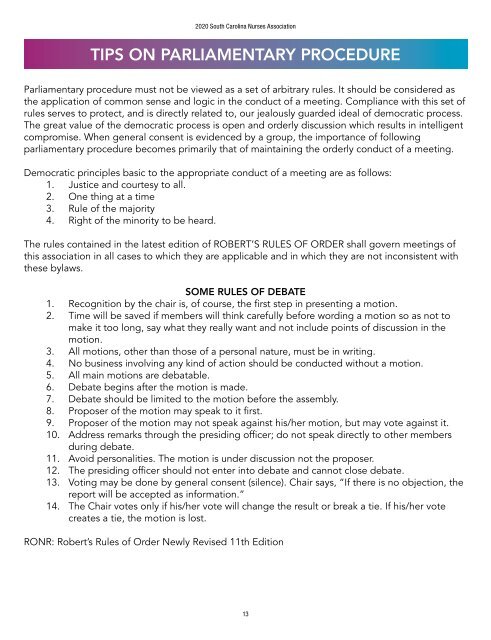South Carolina Yearbook - September 2020
Create successful ePaper yourself
Turn your PDF publications into a flip-book with our unique Google optimized e-Paper software.
<strong>2020</strong> <strong>South</strong> <strong>Carolina</strong> Nurses Association<br />
TIPS ON PARLIAMENTARY PROCEDURE<br />
Parliamentary procedure must not be viewed as a set of arbitrary rules. It should be considered as<br />
the application of common sense and logic in the conduct of a meeting. Compliance with this set of<br />
rules serves to protect, and is directly related to, our jealously guarded ideal of democratic process.<br />
The great value of the democratic process is open and orderly discussion which results in intelligent<br />
compromise. When general consent is evidenced by a group, the importance of following<br />
parliamentary procedure becomes primarily that of maintaining the orderly conduct of a meeting.<br />
Democratic principles basic to the appropriate conduct of a meeting are as follows:<br />
1. Justice and courtesy to all.<br />
2. One thing at a time<br />
3. Rule of the majority<br />
4. Right of the minority to be heard.<br />
The rules contained in the latest edition of ROBERT’S RULES OF ORDER shall govern meetings of<br />
this association in all cases to which they are applicable and in which they are not inconsistent with<br />
these bylaws.<br />
SOME RULES OF DEBATE<br />
1. Recognition by the chair is, of course, the first step in presenting a motion.<br />
2. Time will be saved if members will think carefully before wording a motion so as not to<br />
make it too long, say what they really want and not include points of discussion in the<br />
motion.<br />
3. All motions, other than those of a personal nature, must be in writing.<br />
4. No business involving any kind of action should be conducted without a motion.<br />
5. All main motions are debatable.<br />
6. Debate begins after the motion is made.<br />
7. Debate should be limited to the motion before the assembly.<br />
8. Proposer of the motion may speak to it first.<br />
9. Proposer of the motion may not speak against his/her motion, but may vote against it.<br />
10. Address remarks through the presiding officer; do not speak directly to other members<br />
during debate.<br />
11. Avoid personalities. The motion is under discussion not the proposer.<br />
12. The presiding officer should not enter into debate and cannot close debate.<br />
13. Voting may be done by general consent (silence). Chair says, “If there is no objection, the<br />
report will be accepted as information.”<br />
14. The Chair votes only if his/her vote will change the result or break a tie. If his/her vote<br />
creates a tie, the motion is lost.<br />
RONR: Robert’s Rules of Order Newly Revised 11th Edition<br />
13

















